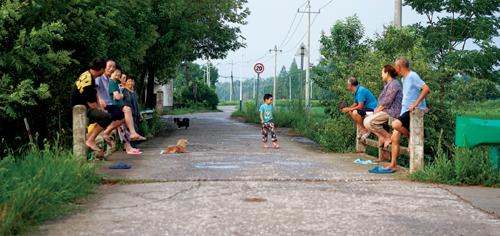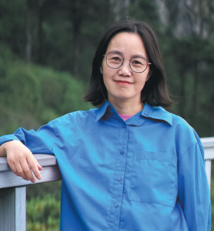Writer delves into home truths
Memories and thoughts of childhood appeal to readers beyond the confines of her village, Yang Yang reports.

Wild fruit in the mountains, countryside plants and birds, bamboo utensils, home-cooked meals, festival customs and stories, and the heartwarming moments of seasonal changes — all these memories of her childhood hometown are ones she can never truly return to.
In her latest essay collection Yueliang Chulai, or Take Me Home, Shen Shuzhi, now living in Beijing, recalls those memories about her hometown in the countryside of Nanling county, Wuhu, Anhui province. Seemingly ordinary and personal, they are also local chronicles and a record of the time.
Born in 1984, Shen and her twin sister were the fourth and fifth daughters in a poor farmer's family. Named Shi Yanping by her parents, Shen grew up in the countryside, where many struggled to feed their families.
Sericulture boomed in the village, allowing young Shen to enjoy mulberries, before fading soon. In an era of material scarcity, a cup of sweet soup was a rare treat for a high school student like her. On Chinese New Year's Eve, parents kept the light in the sty on the whole night, which was a luxury at that time.
By bringing out these memories of bygone years, Shen re-presents a hometown of not only hers, but a whole generation.
"A good author must be able to turn a unique personal experience into a complex life experience that all the readers can relate to," writer Liang Hong said at a book event about Take Me Home in September.
"Her language, like a gently flowing brook, is clear and bright, and meanwhile full of details and warmth of everyday life … giving you an especially real and warm feeling," Liang says.
Commenting on the book, writer A Yi said at a book event in November that Shen's writing is "elegant", "accurate", "detailed" and "naturalistic".
"In a naturalistic style, she tries to return home through words, to a village that's physically impossible to reach," he says.
Shen started writing about the landscapes and life in her hometown in 2010 when she was a postgraduate student of ancient Chinese literature at Nanjing University, inspired by other writers on social media platform and review site Douban. She posted the essays online and attracted many readers.
On Douban, she also got to know some plant enthusiasts who led Shen to learn about the obscure plants and flowers often seen in the surroundings of everyday life. Knowing the name of each tree on campus and their appearance in different seasons thus became a hobby for her. But what's most intriguing for her was to know the wildflowers and plants she saw in the countryside every day as a child.
In her writing, she recalls her childhood life in the countryside, capturing the moods of past days through memories of the plants, customs, food and daily life.
These essays, in a simple language, are natural, poetic and refreshing. Through a pair of warm naturalistic eyes, all the details about the plants, flowers, cooking festive food, making utensils, or farming, impart these works a unique flair that makes nostalgia concrete and heartwarming.
In 2013, Shen published her first book Ba Jiu Shi Zhi Hua (literally, "eight, nine, and 10 sprays of flowers"), which collected essays written from 2010 to 2012, mainly about the delights in her childhood such as the starry sky or spring flowers.
In an article about the book, she talked about the influence she got from the writers she likes — one is Zhou Zuoren and the other is Zhou's student Feng Wenbing, pen-named Fei Ming. In Zhou's works, she found the beauty of a simple writing style and humanitarian spirit and gained an enthusiasm for natural history. From Feng's essays, she learned how to describe the world from a child's eyes.
Besides, she also tried to imitate the writing styles of prestigious essayists Shen Congwen and Wang Zengqi, following the tradition of Chinese classic essay writing.
In 2014, Shen Shuzhi won the Zijin People's Literature Star award for best essay writing organized by one of China's top literary periodicals People's Literature. In 2015, her essay Jiejie ("my elder sisters") won the top nonfiction prize in the writing competition organized by the reading platform of Douban.
In 2017, she published her second book Yanzi Zuihou Feiqule Nali (literally, "where have all the swallows flown"). This was about the stories of the five daughters in a poor rural family.
In a plain and reserved voice, Shen Shuzhi recounts the emotional bonds of the sisters and their own lives, faithfully representing the subtleties of daily existence. With heart-wrenching or heartwarming stories, she records the growing-up process of a generation, faithfully mirroring the changing life in the countryside and representing the refreshing feeling a generation of rural residents had when they left for cities to work or study and also the inevitable pains.
In 2019, the third essay collection by Shen Shuzhi was published, titled Ba Pu Ge (literally, "song of pulling cattails"), still about her hometown in South Anhui — the games played in the countryside in her childhood, the flowers and plants in the rural area, snacks and dishes in the south, a youth's secrets and the "current" life in the countryside and the city. Written between 2013 and 2018, when China was experiencing fast urbanization, the book records the life in the countryside from the past to the present, building a spiritual native land for generations of readers.
All the three books rank high on most popular literary or folk-custom book lists in their publishing years on Douban.
The latest book Take Me Home includes similar subjects in the previous three, but the last essay, spanning 30,000 words, titled Xiangxia De Chenhun (literally, "the dawn and dusk of the countryside"), focused on something different. It's not only about the mellow and tender childhood memories, the harsh part of which have been filtered by time, but also the darker, painful and obscure aspects of the present life in the countryside that she understands deeper through the eyes of a mature writer and an adult woman.
In this essay that the writer spent eight months completing, Shen Shuzhi reveals the imperfect sides of herself and her family, which gave her a deeper understanding of family bonds.
"I wrote this piece because I felt painful. Unless I write it down, I can't write anything else," she says.
"If you can't truly write about the more real and painful parts of your life but the brighter things that you're very used to writing about, it feels like a kind of evasion and deception.
"I must write down the present, so as not to betray the place where I grew up and my parents."
For people who leave for school or work, hometown, even if unchanged over the years, is a place one can never really return to.
As Shen Shuzhi writes in the essay, several times in a year, she would take her son back home to live for a while. Even if she physically lived in the old village, she knew that, "I am a person who now lives in my hometown but whose only connection to it lies in the past".
Shen Shuzhi found similar feelings in the essay by US writer James Wood, Secular Homelessness, who writes that he left home twice, once for university, and then for the US where he had been living with his wife for many years.
"What is peculiar, even a little bitter, about living for so many years away from the country of my birth is the slow revelation that I made a large choice many years ago that did not resemble a large choice at the time; that it has taken years for me to see this; and that this process of retrospective comprehension in fact constitutes a life — is indeed how life is lived."
At the end of the essay, Shen Shuzhi also writes that people were unaware that their journey from village school to out-of-province university was a gradual farewell, and that leaving meant they could never return to how things once were.
"Now, within each cycle of return and departure, we felt the alienation, comfort, loneliness, incompleteness, and sorrow. In our own ways, doing what we can, perhaps including recording these moments, we can complete a part of our lives," she writes.




Today's Top News
- Xi stresses strategic importance of work to raise minors' moral standards
- Jimmy Lai found guilty of colluding with foreign forces
- Hong Kong court opens session to deliver verdict on Jimmy Lai's case
- China's economy posts steady growth in Nov
- Death toll rises to 16 in Sydney's Bondi Beach shooting
- Tariffs proving costly for US and partners






























